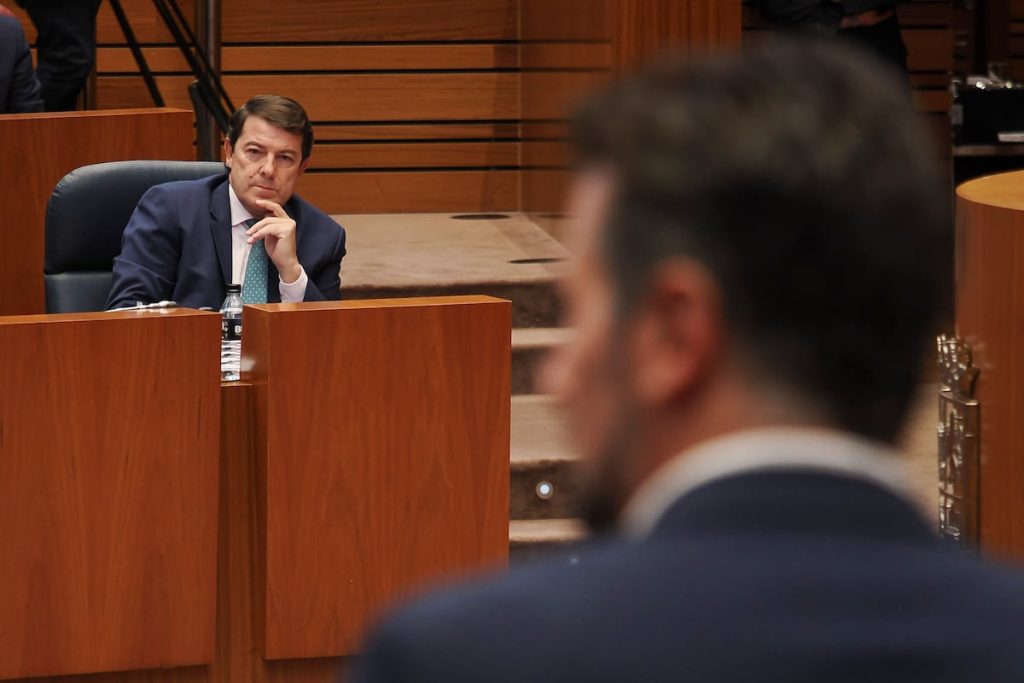The rupture between Vox and the PP in Castilla y León has opened up new scenarios of political tacticism. The Budgets prepared by Alfonso Fernández Mañueco’s team are expansive, totaling 15.084 million euros, increasing in investment but decreasing in parliamentary support due to the absence of the far-right party. Vox has already expressed its refusal to the first procedure, the spending limit, and this weakness of the PP opens up opportunities for the PSOE, which is considering abstaining in the vote on Wednesday. This step aside implies keeping the budget debate process going, where they want to show Mañueco’s loneliness and lack of consensus. The political cost is minimal, as it is just a formality. Sources from the PP admit that if both the PSOE and Vox were to vote against the spending limit, as expected, they would have the narrative ready: they have fulfilled their responsibility and the opposition is thwarting governance. However, they believe that a Socialist abstention changes the game.
The weeks leading up to this formality have been filled with movements. The Budgets drawn up by Mañueco’s team have allowed him to make headlines in the regional media with promises of investments in all provinces, but with no concrete agreements in the Cortes, where he governs in a minority. They did not engage in negotiations with other groups, as these criticized the lack of dialogue. Sources from the party admit that under this isolation, a strategy was to promote these expansive but fragile Budgets, and when they were frustrated by the PSOE and Vox in the parliamentary debate, starting with the spending limit, blame them for hindering governance, claim to have fulfilled their responsibility, and be free to extend the previous Budgets from May or take more drastic measures if necessary. “I believe Mañueco would prefer the Budgets not to be discussed,” admits a member of his party.
The first reactions to the spending limit procedure indicated positions: former Vice President Juan García-Gallardo (Vox) disapproved of the Budgets with “gestures towards left-wing policies” and being “electoralist”. Podemos and minor parties like Unión del Pueblo Leonés and Soria ¡Ya! did not express support, except for certain demands. The leader of the opposition, Luis Tudanca, refused but opened the possibility of abstention, linking it to the PP doing the same nationally and in municipalities. He highlighted their responsibility in supporting the Castilla y León Budgets but not the national ones. The socialists have also requested key investments, but privately admitted that these movements hide the possibility of also abstaining and pushing Mañueco into the complicated process of presenting solid Budgets, negotiating, facing amendments, and months of difficulties and lack of control over the agenda, especially when the chances of approval are slim.
“The abstention is the most intelligent, responsible, and consistent approach,” admit voices from the PSOE, both tactically and politically. They see it as a way to show the public their willingness to govern, while the PP is not interested in negotiating Budgets. Furthermore, as it is a formality, there is no political cost. A recent example highlighting Mañueco’s position was seen with the Concordia law: the socialists supported its continuation, with Vox, and the PP voted against it, showcasing a changed stance. The possibility of abstention also affects other figures in the Chamber, such as former Vice President Francisco Igea, an independent now. He believes that the PSOE should not hesitate to abstain, as they only stand to gain from it. Removing Mañueco from his comfort zone of extended narratives and prolonged accounts. It forces the PP into a tough negotiation process, where the opposition gains visibility with their proposals, putting pressure on the PP to accept new investments.
Overall, the rift between Vox and the PP in Castilla y León has created a complex political landscape. The Budgets prepared by Mañueco’s team face challenges due to the absence of support from Vox and potential abstention from the PSOE. The strategy of blaming the opposition for hindering governance by rejecting the Budgets may not hold if abstentions occur. The possibility of abstention opens up various scenarios, including a challenging negotiation process and potential weaknesses for the PP if the Budgets are not approved. The political implications of these movements and decisions will shape the future dynamics of governance in Castilla y León.















